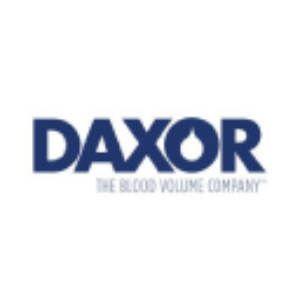Daxor's Blood Volume Analysis Validated for COVID and Sepsis Patients in New Peer-Reviewed Pilot Study Published in the Journal of Critical Care
Rhea-AI Summary
Daxor Corporation (Nasdaq: DXR) announced significant findings from a new pilot study published in the Journal of Critical Care, validating their Blood Volume Analysis (BVA) technology for COVID-19 and sepsis patients. The study revealed that 48% of COVID-19 patients were incorrectly assessed for fluid status by clinicians, highlighting the critical need for more accurate measurement tools.
The research demonstrated that sepsis patients showed higher albumin transudation rates compared to COVID-19 patients, indicating more severe blood vessel integrity breakdown. The study coincides with Daxor's recent FDA clearance in August 2025 for their new rapid BVA system, which is three times faster than their previous BVA-100™ analyzer while maintaining 95% accuracy.
Positive
- None.
Negative
- Clinical study reveals widespread misdiagnosis in current fluid assessment methods
- Study shows persistent capillary leakage issues in both COVID-19 and sepsis patients
News Market Reaction – DXR
On the day this news was published, DXR gained 6.59%, reflecting a notable positive market reaction. This price movement added approximately $3M to the company's valuation, bringing the market cap to $54M at that time.
Data tracked by StockTitan Argus on the day of publication.
Study Demonstrates That Clinical Assessments of Fluid Status Are Often Inaccurate, Highlighting the Urgent Need for BVA and Other More Reliable Tools in Landmark Pilot Study
Oak Ridge, TN, Sept. 04, 2025 (GLOBE NEWSWIRE) -- Daxor Corporation (Nasdaq: DXR), the global leader in blood volume measurement technology, today highlighted the significant findings of a new pilot study published in the Journal of Critical Care. Co-authored by leading intensive care expert Jan Bakker, M.D., Ph.D., this pivotal research reveals frequent inaccuracies in how doctors clinically assess fluid levels in critically ill patients with sepsis and COVID-19.
The research, titled, "Endothelial dysfunction in critically ill patients with sepsis and COVID-19 using the albumin transudation rate: A pilot study," found that patients were often misclassified during clinical assessment, with many mistakenly believed to be "hypervolemic" (fluid overloaded) when objective measurements showed them to be "hypovolemic" (fluid deficient), and vice-versa. This critical discrepancy can lead to insufficient fluid administration or dangerous fluid overload, highlighting a significant challenge in critical care.
Key Findings from the Study:
- Pervasive Misdiagnosis: Clinicians frequently misjudged the total blood volume (TBV) in patients suffering from COVID-19 or sepsis. For instance,
48% of COVID-19 patients were clinically deemed hypervolemic when objectively hypovolemic, and clinicians often misclassified sepsis patients as euvolemic or hypervolemic when they were hypovolemic - Persistent Capillary Leakage: The study showed that "albumin transudation rate (ATR)," a measure of fluid leaking from blood vessels into tissues, was persistently elevated in both sepsis and COVID-19 patients throughout their ICU stay
- Higher Leakage in Sepsis: Patients with sepsis exhibited significantly higher ATR than those with COVID-19, indicating a more severe and sustained breakdown in blood vessel integrity in sepsis, despite often having lower admission severity scores
- Urgent Need for Better Tools: The study concludes there is a "frequent inaccuracy in clinical fluid status assessment, which demands more reliable diagnostic tools to better guide fluid therapy in critically ill patients”
"This groundbreaking study reinforces what we at Daxor have long understood: accurate, real-time blood volume measurement is essential in critical care, especially for conditions that are characterized by fluid imbalances and widespread endothelial dysfunction," said Michael Feldschuh, Daxor’s President and CEO. "Sepsis, a leading cause of hospital deaths, benefits from effective individualized fluid management, and our BVA technology provides this unique capability to accurately measure volume where other existing methods sometimes fall short.”
Daxor’s FDA-approved BVA-100™ Analyzer was utilized in this study to objectively measure total blood volume and albumin transudation rates. The findings highlight the immense promise of Daxor's Blood Volume Analysis (BVA) technology in the Intensive Care Unit (ICU) and critical care settings. Mismanaged fluid levels can lead to severe complications, longer hospital stays, and increased mortality. By providing precise and direct measurements, BVA empowers care teams to make informed decisions, leading to better patient outcomes and significant cost savings for healthcare systems.
The need for rapid and accurate diagnostics in critical care is now more pressing than ever. This new research, coupled with Daxor’s recent FDA Clearance in August 2025 for its new rapid, lightweight, battery operated BVA system, positions Daxor to address this critical medical challenge. This next-generation analyzer, which is three times faster than the BVA-100™ but still over
Daxor leadership noted that "a meaningful expansion of the Company's revenue in the area of critical care medicine is possible, driven by a combination of new data, new funding opportunities, and our next-generation analyzer, which promises a speedy workflow critical to this specialty." The company continues to advance its technology with support from non-dilutive funding sources, including contracts from the U.S. Department of Defense and grants from the National Institutes of Health.
About Daxor Corporation
Daxor Corporation (NASDAQ: DXR) is tackling healthcare's "multi-billion-dollar silent crisis", the inability to precisely measure blood volume. This often results in suboptimal care, prolonged hospital stays, and increased readmissions for many high-cost medical conditions like heart failure and those requiring ICU care. With 50 years of experience and innovation, Daxor's patented, FDA-cleared Blood Volume Analysis (BVA) diagnostic offers unmatched, real-time, precise data via its rapid, hand-held, lab-based system. This empowers clinicians to make individualized treatment decisions that significantly improve patient outcomes and deliver substantial efficiencies in value-based healthcare. Daxor is ISO certified and operates a U.S.-based, 20,000-square-foot state-of-the-art manufacturing facility, positioning the company for accelerated market expansion.
For more information, please visit our website at Daxor.com.
Sign up to receive news on Daxor’s innovative technology HERE.
Forward-Looking Statements
Certain statements in this release may include forward-looking statements within the meaning of the Private Securities Litigation Reform Act of 1995, including without limitation, statements regarding the impact of hiring sales staff and expansion of our distribution channels. Forward-looking statements are predictions, projections and other statements about future events that are based on current expectations and assumptions and, as a result, are subject to risks and uncertainties. Many factors could cause actual future events to differ materially from the forward-looking statements in this release, including, without limitation, those risk associated with our post-market clinical data collection activities, benefits of our products to patients, our expectations with respect to product development and commercialization efforts, our ability to increase market and physician acceptance of our products, potentially competitive product offerings, intellectual property protection, FDA regulatory actions, our ability to integrate acquired businesses, our expectations regarding anticipated synergies with and benefits from acquired businesses, and additional other risks and uncertainties described in our filings with the SEC. Forward-looking statements speak only as of the date when made. Daxor does not assume any obligation to publicly update or revise any forward-looking statements, whether as a result of new information, future events or otherwise.
Investor Relations Contact:
Investor Relations Contact:
Bret Shapiro
COO – Head of Capital Markets
COREIR
(561)-479-8566-Cell
brets@coreir.com|www.coreir.com








